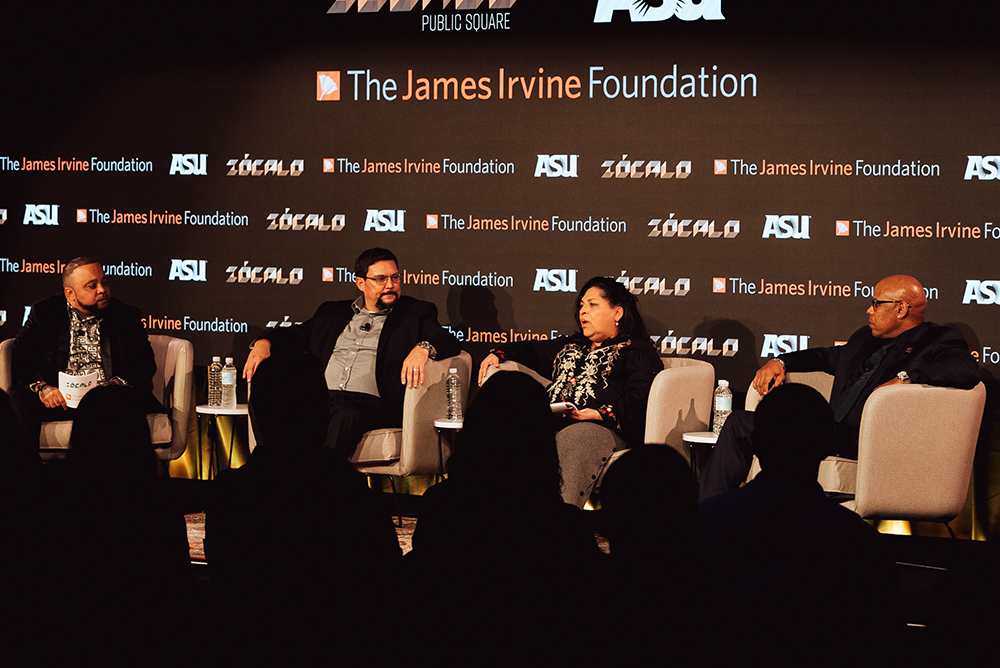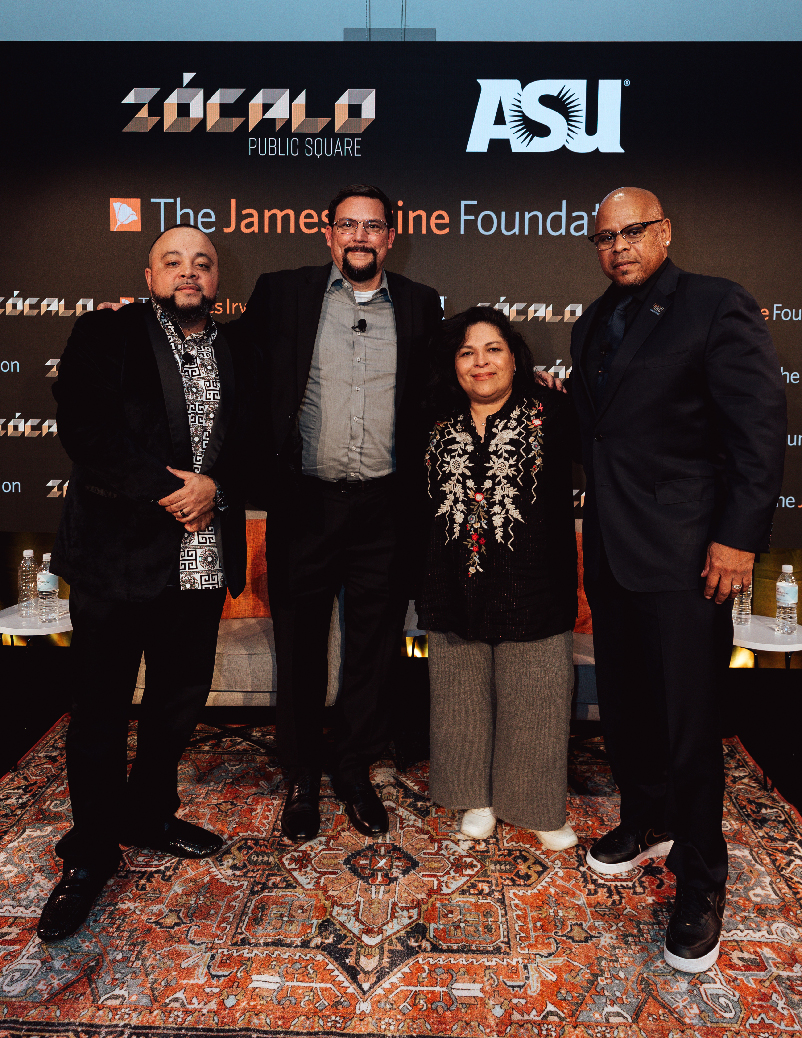
From left to right: Gilbert Johnson, Doug Bond, Carmen Garcia, and Sam Lewis.
What is a good job now?
That has been the guiding question for Zócalo’s ongoing series investigating low-wage work across sectors in California—supported by The James Irvine Foundation. Thus far, we’ve gone to Riverside to discuss tourism and hospitality, Fresno to discuss health care, Sacramento to discuss fairness in the workplace, and, this week, in downtown Los Angeles, we brought together leaders in the field of reentry and anti-recidivism to discuss what people leaving prisons and jails need to succeed in work, and in life.
To help formerly incarcerated people get a real “second chance” in society, all identified the importance of community-based organizations that are giving formerly incarcerated people the support—through education, mental and physical health care, policy, housing, and more—to find employment and build sustainable careers.
Gilbert Johnson, director of Strategic Reentry Initiatives at the Office of L.A. Mayor Karen Bass, who moderated the event, started the conversation by asking the panelists how they came to this line of work.
Amity Foundation president and CEO Doug Bond was himself a recipient of Amity’s services as a child. The organization got him out of foster care and reunited him with his formerly incarcerated father, and, later, helped his mother once she was released from prison.
Root & Rebound’s executive director Carmen Garcia started at the organization as a legal assistant through a work-study program at City College of San Francisco. “When I left federal prison, the women there said ‘move forward, don’t look back,’” Garcia said. “But there was that internal conflict for me. I just couldn’t leave the women behind and continue acting in this world as if I wasn’t [once] in their position.”
Anti-Recidivism Coalition executive director Sam Lewis shared the story behind a Polaroid that sits on his desk at home. It’s a picture of him and his mom in 1990 when she visited him in prison on his 21st birthday. It was that day, three years into a life sentence, that he told his mom, “This is wrong… I’m going to change this one day.” When he was finally released home, he found support through community organizations like Friends Outside, which helped him find employment. This further inspired him to work to transform the rehabilitation and corrections system and help people like him—young, of color—on the inside. “I’m one of many in this army of reform that is transforming the system to make it more compassionate, with accountability but with respect and opportunity,” Lewis said.
Opening up pathways from prison to the workplace is beneficial for everyone. Yet for anyone with a criminal record, respect and opportunity are hard-won, Johnson said. That’s why ending the societal stigmas that exist around people who’ve been formerly incarcerated must be the first step in this conversation.
Garcia agreed, saying that she felt like her time in prison was a “scarlet letter.” It is hard to move forward in prospective employment opportunities if people are only willing to see you as an “inmate, criminal, or convict.” The same is true for housing and schooling, she noted.
Such stigmas have long been enshrined in law and policy, which have locked formerly incarcerated people out of entire job sectors in order to “further punish a person” long after they served their time, Johnson said.
Bond noted some victories, such as the “ban the box” legislation in California, which bars most employers from asking a candidate about their conviction history before making a job offer. Proposition 47, too, which passed in 2014, allows Californians to expunge or reduce their convictions on record.
Changing law and policy is important, Lewis said, nodding to the long shadow cast by histories of racist financial loans and redlining that helped create “generational poverty” that reinforces the cycle of mass incarceration. Voting—and political will—can challenge this. “California,” he added, “is leading in many ways.” In the last two decades, California’s prison population has drastically declined, in part because of judicial rulings and the COVID-19 pandemic, which accelerated releases. Some prisons are even set to close. All of this, Bond noted may signal a move to “un-mass incarceration.”
Making employment more inclusive for formerly incarcerated people also makes economic sense, Bond said. In various struggling sectors or those with large work shortages, like Hollywood or health care, filling roles becomes beneficial to those industries and the overall economy.
So, asked Johnson, the moderator, what else is standing in the way of good jobs for people coming out of the corrections system?
“I don’t want any of my people to come out to get a job. I want them to have careers,” Lewis stated. Later, he brought up the idea of retirement for those that spent years incarcerated. “I did the math,” he said, having worked for 14 years since leaving prison. “I will have to work the rest of my life. What about the person who comes home at 65?”
Another crucial factor that all the panelists spoke on was the need for mental health services. Johnson noted that society must target the root causes and circumstances, to “unpack trauma,” in order to rehabilitate people and ready them for good, stable, and successful work. “I was in my own prison long before I went to prison,” Garcia noted, speaking about the traumas she faced as a child. “We need therapy,” both Garcia and Lewis stated. Mental health care should be part of robust primary health care, Bond added.
Johnson asked all the panelists what they would demand of society and employers.
Invest in our organization to support people coming out of incarceration with housing and employment, Garcia said. Connect people reentering with big companies, Lewis said. And offer paid trainings and stipends for education and housing, Bond said.
The conversation on stage was complemented by a virtual reality station presented by ASU’s Narrative and Emerging Media program where audience members could experience “After Solitary,” which shares the story of Kenny Moore’s time in solitary confinement. Guests who stuck around for the reception were also able to taste food catered by 2nd Chance Soul Food Fish Fry, an Inglewood restaurant that employs formerly incarcerated people.
As the conversation came to an end, an in-person audience member, who had been formerly incarcerated, asked how the panelists thought people reentering society could break the “defeatist mindset” they might experience.
They all shared sentiments about their own work and lived experience that reverberated with something Johnson said earlier: “Community organizations are standing as the first line of defense for those coming home.”





Send A Letter To the Editors